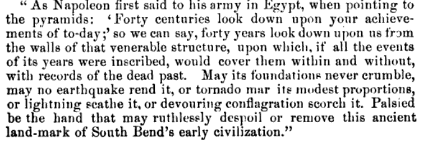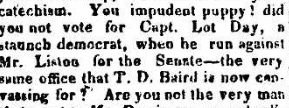It’s in the 19th chapter of Genesis that Lot and his family fled to escape the destruction of Sodom. The angels had warned them and sent them hastily on their way but provided one strange and specific caveat. No matter what happened, they were not to turn back. Of course, the story tells that Lot’s wife couldn’t resist rubbernecking the city that burned behind her, and for her insolence, she was turned into a pillar of salt.
As for Lot Day, born in New Jersey in 1795 and transplanted to South Bend by 1831, he lived like a man who’d learned the lesson from the story of his Biblical eponym. A pioneer through and through, Day was always on the lookout for new places, and for the duration of his life, he never turned back.

Born as one of fourteen children in a crowded house, Day must have had a yearning for wide open spaces since he was a youngster. He set in his earliest years to finding a way to build a life of his own, joining the Army when he was just 16, and rising to the rank of Captain during Tecumseh’s War in 1813. A year later, he mustered out of the military when he was still just 19, got married, and set to the important work of fathering a dozen children of his own. He established a business as a tanner and a brickmaker in Auburn, New York; but as that town grew, Day’s claustrophobia overtook him. He took his young family and moved them west, settling in South Bend in 1831.
The place had a population less than 120 when the Days arrived, but their brood would increase the town’s census by a full ten percent. Capt. Lot Day, as virtually everyone in town called him, was ready to make his mark in a new place. He served as an early county commissioner before winning a term as county sheriff in 1842.
The Days moved into a proud new home that same year, acquiring the Bainter-Smith house at the corner of what is now LaSalle and Main streets. The place was an iconic dwelling in the earliest years of South Bend. It was the first brick house in town, and its list of owners constitutes a who’s who of South Bend’s earliest figures; including Coquillards, Cottrells, Defreeses and Rushes. The Frederick Bainter who built the place was, by all accounts, known colloquially around town as Frederick the Great. During the 1840s, whoever lived in the old Bainter house might well have been the King of South Bend, at least to hear Chapman tell it in his History of St. Joseph County.

Anyway, the house was torn down ten years after Chapman’s book was published. It’s uncertain whether anyone was stricken with palsy for the deed.
Day’s accomplishments during his time in town were significant. During his term as sheriff, he built a new prison with his own bricks for the tidy sum of $1,850. On a few occasions, he served in official roles in the state’s Democratic conventions.
But not everything was perfect for Lot Day and family. On July 4, 1844, an unfortunate peacetime cannon accident left Day’s son, Lot Day Jr., permanently disfigured. The boy lost a hand when the thing backfired, casting a pall over South Bend’s Independence Day festivities that year. The younger Lot Day was still able to serve as the county’s deputy sheriff beneath his old man despite the crippling accident.
By 1847, after multiple campaigns for the State Senate; Capt. Lot Day was finally elected to that body as a Democrat from South Bend, an event that prompted a mostly incomprehensible but utterly delightful op-ed in The Goshen Democrat:

“You impudent puppy!”
When his term in the Statehouse ended, Lot Day might have returned to South Bend to live a quiet life as one of his city’s elder statesmen, but he didn’t know how to live a quiet life and he certainly didn’t know how to turn back. The man was a lot of things, but more than anything else, he was a pioneer with a thirst for wide open spaces. As for South Bend, it was closing in on him quickly.
By 1850, there was a whole new west to conquer and there was a new trail that was taking people there. Day left the Hoosier state for Oregon at the age of 50, a few years before the Studebakers came to South Bend to build the wagons that could have taken him there.
In total, Lot Day was in South Bend for fewer than 20 years, but he was honored with a road named in his honor in 1933. Day Road replaced Door Road in the northeast part of the county, long after the Day’s children and grandchildren stopped living in Indiana.
Capt. Lot Day died in Elko, Nevada, in 1874 and was buried in California.
Aaron Helman is an author, historian and adventurer from South Bend. He loved the Oregon Trail video games. His books are available at aarohelman.com/books.
